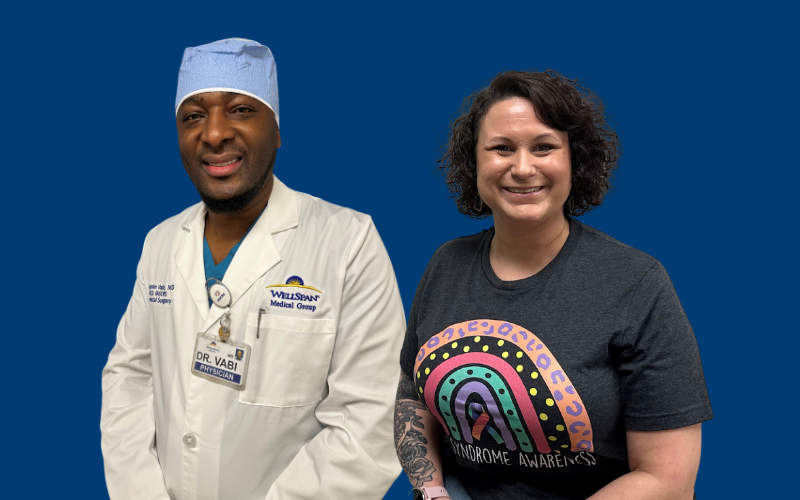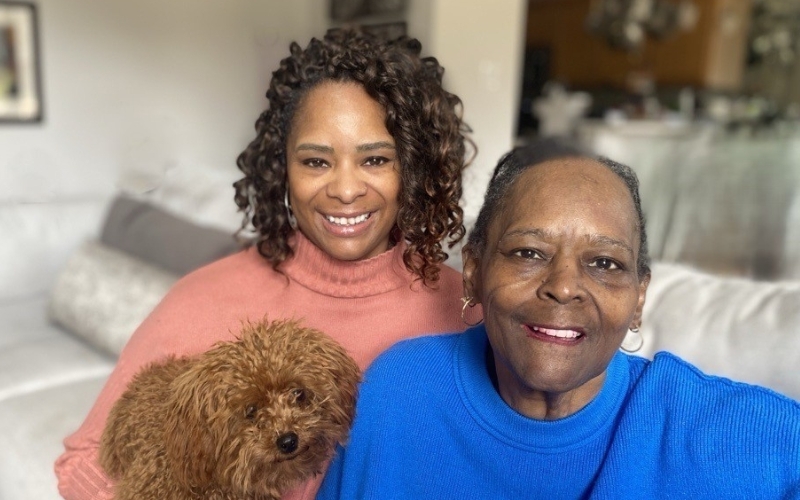Kati Reynolds and Shermaine Croney recently learned they have Lynch syndrome, an inherited genetic disorder that increases their chances of being diagnosed with colorectal and other types of cancer.
The two York County women among about 150 people who have tested positive for the disorder after they submitted a blood sample to the WellSpan Gene Health Project, which offers participants a no-cost genetic test that may determine their potential risk for certain cancers and heart disease. Those who test positive as genetic carriers are offered follow-up genetic counseling designed to help them reduce their risks, testing and other related care.
Like many people, neither Kati nor Shermaine had ever heard of Lynch syndrome before they learned they had the genetic disorder. But colorectal cancer already has deeply impacted both of their lives.
“I was scared by this diagnosis,” Shermaine says. “It was very emotional, but I would not change my decision to have the screening. I am extremely thankful that I have this information.”
Lynch syndrome
Lynch syndrome is passed from parents to children, in the form of a genetic mutation. If one parent has the mutation, each of their children has a 50% chance of inheriting it. About 1 in 270 people has Lynch syndrome, or about 1 million people in the United States.
Lynch syndrome carriers have a greater chance of developing colorectal cancer, uterine cancer, ovarian cancer, small bowel cancer, skin cancer and other cancers at some point in their lives.
“Colon and uterine cancer are the big two, the cancers that are the highest risk for people with Lynch,” says Tatiana Chichilla, a WellSpan genetic counselor.
WellSpan genetic counselors make several recommendations when they meet with someone who has tested positive for Lynch syndrome. They recommend these patients undergo colonoscopies every one or two years, a schedule that is more frequent than what is recommended for those at average risk. Female patients also may want to consider whether they should undergo surgery to remove parts of their reproductive system, to reduce their risk of uterine or ovarian cancer. Another recommendation is to undergo regular skin checks, as Lynch syndrome can cause a particular type of lesion.
“Lynch syndrome can be a very manageable condition,” Tatiana says. “I want people to know if they are at risk because they can take charge of their health by having different screenings and lowering their risk of cancer. It can be scary to find out you have an increased risk to develop cancer, but we have the ability to help you make informed choices about your health.”
Kati and Shermaine are following the recommendations offered to them, as well as modifying their lifestyle to reduce further risks by eating more fruits, vegetables and fiber, and less processed foods and meat, and exercising regularly. They also are talking to other family members about their diagnosis in case those relatives want to undergo testing as well.
Kati’s story

Dr. Benjamin Vabi and Kati Reynolds
About a year ago, Kati, a mom who works as an administrative assistant, started telling her husband that she just didn’t “feel right.” She was having night sweats, terrible heartburn and a pain under one rib. Then she saw blood in her stool, a key symptom of possible colorectal cancer. She had a colonoscopy a short time later and was diagnosed with colorectal cancer and then Lynch.
“People say, ‘Wow you’re so young!’” says Kati, who turns 39 in April.
Dr. Benjamin Vabi, a WellSpan colorectal surgeon, removed her tumor using the state-of-the-art robotic surgery and she had follow-up chemotherapy. She is undergoing scans to monitor her condition.
“This scared me,” she says. “My son is only 12 and I kept putting it off and ignoring it. I have learned to listen to my body more. If you think something is wrong, get it checked. Don’t keep putting it off.”
Shermaine’s story

Shermaine Croney and her mom, Linda Marshall
Shermaine, a 52-year-old mom, grandma and career coach from York, was waiting for her mother to undergo a medical procedure at WellSpan York Hospital, when she saw information about the WellSpan Gene Health Project.
“At the time, there was no cancer in my immediate family, but I just had a feeling I should get the testing,” she says. “I am a woman of faith, and I believe 100% that it was placed it my spirit to move forward and get it done.”
About a month later, Shermaine’s mother, Linda Marshall, who had not been feeling well, was diagnosed with colon cancer. About a week after that, Shermaine got her genetic test results and learned she has Lynch syndrome, likely inherited from her mother, who found out later that she also has the syndrome. Knowledge is power, Shermaine says.
“Often times we don’t want to know, especially in our communities of color,” she says. “But the Black community has the highest rate of colorectal cancer of any ethnic group. We need to be shouting this from the mountaintops to make sure that people have their colonoscopies and take care of their health.”
Learn more about the WellSpan Gene Health Project here.
Tags:


